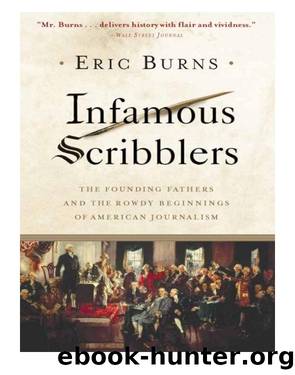Infamous Scribblers by Eric Burns

Author:Eric Burns
Language: eng
Format: epub
Publisher: PublicAffairs
Published: 2011-04-06T16:00:00+00:00
These papers remind us, if we need the reminding, that the Founding Fathers were not, as we sometimes like to think, a single entity, a group of men bound together by genius, good will, and identically defined concepts of love of country; in fact, they were not a group at all, but individuals in the most cantankerous sense, often at odds with one another, often contemptuous of one another. The nation they bequeathed to posterity was more the result of the compromises they made grudgingly than the points to which they acceded with grace. On Mount Rushmore, Jefferson peers contentedly over Washington’s shoulder; in real life, the two men were seldom that close, and Jefferson did not always regard the first president with so placid an expression.
At various times, and with varying degrees of intensity and openness, the period’s other sets of combatants were as follows: Adams versus Franklin, Jefferson versus Franklin, Gouverneur Morris versus Jefferson, Adams versus Washington, Madison versus Washington, Madison versus Hamilton. And then there were the tag teams, the compositions of which would change from time to time—Madison and Jefferson versus Jay, Hamilton and Jay versus Jefferson, Monroe and Jefferson and a few others versus Hamilton.
The two preeminent foes of the period, though, the two men who most symbolized their respective positions on federalism and thus the extreme polarity of American politics at the time, were Jefferson and Hamilton, respectively the secretary of state and secretary of the treasury under Washington as the passionate decade began.
Jefferson, some believed, wanted to hand the country over to the farmers, while Hamilton supposedly wanted to hand it over to the financiers.
Jefferson, it has been said more recently, favored a seventeenthcentury economy, while Hamilton embraced notions that would not come to full flower until the twentieth.
Jefferson wanted the states to pay their own Revolutionary War debts as a means of retaining their autonomy, while Hamilton wanted the federal government to assume them, a gift horse, some Americans feared, that would make the states ever more subservient to their benefactors.
Jefferson wanted the government to institutionalize the planter society of the South, or at least certain aspects of it, while Hamilton lobbied for urbanity and industrial growth.
Jefferson supported the French Revolution even when the extremists known as the Jacobins turned it into the Reign of Terror, in part because it reminded him of the American revolution, in part because the French had aided the colonists’ efforts during the war, and in part because he had served as the American minister to France from 1784 to 1789 and found it the most congenial of places. Hamilton, on the other hand, grew ever more repulsed by the behavior of the Parisian mobs, ever more respectful of the orderly proceedings of the British king and Parliament.
The arguments between the two men were bitter, devious, and unremitting, a source of constant vexation to the chief executive in whose cabinet they served. According to Joseph J. Ellis, who has written biographies of both Washington and Jefferson:Jefferson accused
Download
This site does not store any files on its server. We only index and link to content provided by other sites. Please contact the content providers to delete copyright contents if any and email us, we'll remove relevant links or contents immediately.
Cecilia; Or, Memoirs of an Heiress — Volume 1 by Fanny Burney(31322)
Cecilia; Or, Memoirs of an Heiress — Volume 3 by Fanny Burney(30928)
Cecilia; Or, Memoirs of an Heiress — Volume 2 by Fanny Burney(30884)
The Great Music City by Andrea Baker(21166)
We're Going to Need More Wine by Gabrielle Union(18064)
Bombshells: Glamour Girls of a Lifetime by Sullivan Steve(13100)
Pimp by Iceberg Slim(12922)
All the Missing Girls by Megan Miranda(12739)
Fifty Shades Freed by E L James(12443)
Norse Mythology by Gaiman Neil(11873)
Talking to Strangers by Malcolm Gladwell(11859)
Crazy Rich Asians by Kevin Kwan(8340)
Mindhunter: Inside the FBI's Elite Serial Crime Unit by John E. Douglas & Mark Olshaker(7827)
The Lost Art of Listening by Michael P. Nichols(6461)
Enlightenment Now: The Case for Reason, Science, Humanism, and Progress by Steven Pinker(6402)
Bad Blood by John Carreyrou(5760)
The Four Agreements by Don Miguel Ruiz(5502)
Weapons of Math Destruction by Cathy O'Neil(5029)
We Need to Talk by Celeste Headlee(4861)
